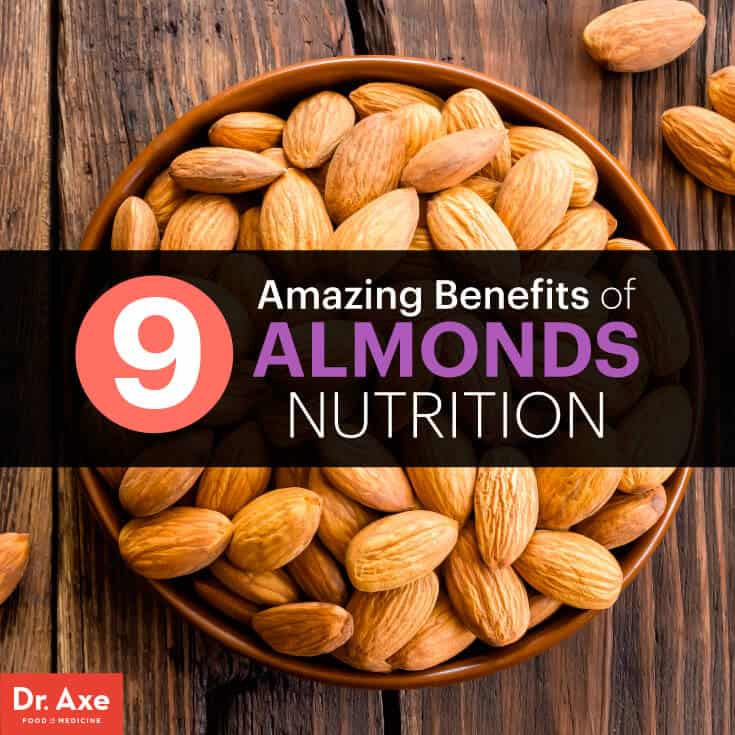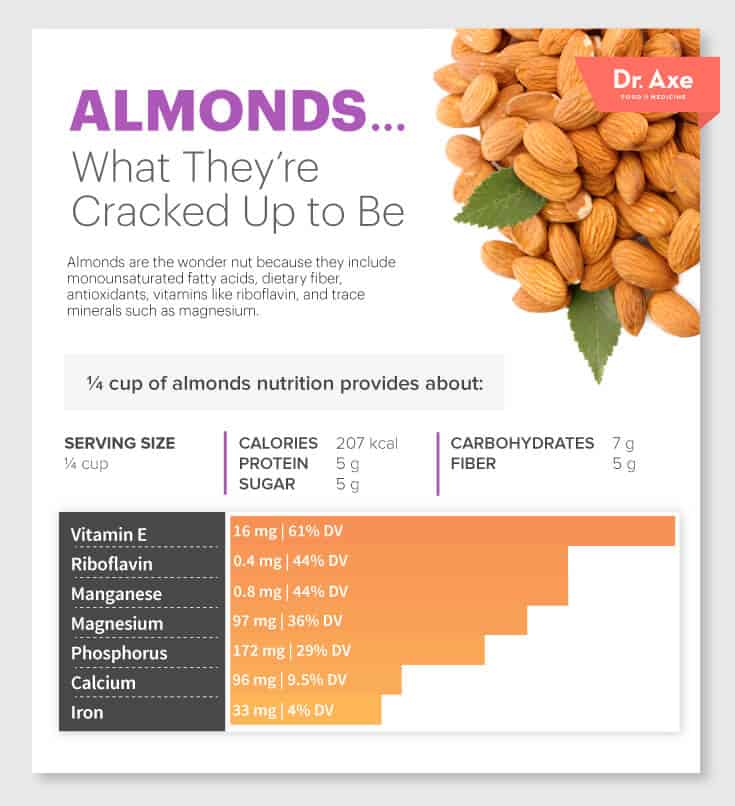9 Amazing Benefits of Almonds Nutrition
https://infoniger.blogspot.com/2016/10/9-amazing-benefits-of-almonds-nutrition.html

Almonds have been prized since ancient times as one of humankind’s most beloved nuts. They were popular in the diets of ancient Egyptians and Indian populations. Ancient Indian Ayurvedic practitioners even believed that almonds were capable of increasing brain capacity, intellectual ability and longevity.
Today, almonds nutrition benefits are praised around the world, and they are used in numerous different ways: eaten raw as a healthy snack; as the base ingredient in almond butter, almond milk or almond flour; and even in many body lotions and fragrances.
Cholesterol reduction is the most celebrated health benefit of almonds, but there are many other vital health benefits of almonds nutrition. Almonds are low in saturated fatty acids, rich in unsaturated fatty acids, and contain filling fiber, unique and protective phytosterol antioxidants as well as plant protein.
And don’t fear the fat in almonds — almonds are actually beneficial when it comes to losing weight, despite their higher calorie content. One study even found that almonds consumed as snacks reduce hunger and desire to eat later in the day, and when dieters eat almonds daily they reduce their overall calorie intake.
Almonds Nutrition: The Facts Behind the Benefits
Botanically, almonds (scientifically termed Prunus dulcis) are actually very small stone fruits in the Amygdalus family and related to other fruits that contain hard pits, including cherries, plums and peaches. Almonds are a type of drupe nut, which means along with other nuts like macadamias, pecans and walnuts, they have multiple layers that enclose a single, hard seed in the center.
Almonds are considered dry drupes so they first must be extracted (which is called “shelling”) before being sold and eaten, which is why you might see the description “shelled almonds” when you purchase ready-to-eat almonds.
In the medical world, almonds nutrition is most praised due to the presence of monounsaturated fatty acids, dietary fiber, antioxidants, vitamins like riboflavin, and trace minerals such as magnesium.
Although almonds are high in calories and considered “energy-dense” (as all nuts are), they provide a whole range of critical nutrients and chemical compounds that often lack in the standard American diet (sometimes called “SAD”).
¼ cup of almonds nutrition provides about:
- 207 calories
- 5 grams of protein
- 5 grams fiber
- 7 grams of carbohydrates
- 5 grams of sugar
- 16 milligrams vitamin E (61 percent DV)
- 0.4 milligrams riboflavin (44 percent DV)
- 0.8 milligrams manganese (44 percent DV)
- 97 milligrams magnesium (36 percent DV)
- 172 milligrams phosphorus (29 percent DV)
- 96 milligrams calcium (9.5 percent DV)
- 33 milligrams iron (4 percent DV)

9 Proven Health Benefits of Almonds
1. Help Prevent Heart Disease and Heart Attacks
Two of the star chemical compounds of almonds nutrition are healthy monounsaturated fatty acids (abbreviated as MUFAs, the same kind of beneficial fat found in olive oil) and antioxidants that support heart health and prevent factors of cardiovascular disease. Almonds specifically supply antioxidant flavonoids, plant-based compounds present in the skin of almonds that work with vitamin E to improve artery health and reduce iflammation.
Almonds nutrition also holds key nutrients to heart health, including arginine, magnesium, copper, manganese, calcium and potassium. Studies show almonds have a consistent “bad” LDL cholesterol-lowering effect, especially in individuals with high cholesterol and diabetes.
Almonds help prevent damage from forming within artery walls and protect against dangerous plaque buildup. Almonds nutrition benefits also make them a great food to support healthy cholesterol and blood pressure levels, in addition to fighting weight gain and obesity — three of the biggest risk factors associated with heart attacks and stroke.
2. Support Healthy Brain Function
Almonds are often considered one of the best brain foods. Almonds nutrition is somewhat unique in that almonds contain riboflavin and L-carnitine, two key nutrients capable of positively affecting neurological activity and preventing cognitive decline. This is one reason why adults, especially the elderly, are encouraged to eat nuts several times per week — since they are associated with a reduction in the risk for inflammation that can cause brain disorders including dementia and Alzheimer’s disease.
3. Maintain Skin Health
Almonds are a great source of vitamin E and other antioxidants that nourish the skin and reduce signs of aging. Research finds that almonds nutrition contains high concentrations of catechin, epicatechin and flavonol antioxidants, including quercetin, kaempferol and isorhamnetin — compounds that fight skin cancer and damage by reversing oxidative stress from a poor diet, pollution and UV light exposure. Almonds’ healthy fats, plus their ability to improve circulation, also help keep skin hydrated and better able to heal wounds.
4. Help Control Blood Sugar Levels and Prevent Diabetes
Almonds’ rich supply of MUFAs helps slow the rate at which glucose (sugar) is released into the bloodstream. In addition to managing blood sugar and preventing insulin resistance (which can occur over time when the body becomes less reactive to insulin, the sugar-controlling hormone), almonds nutrition benefits include the ability to lower other common diabetes risks: unhealthy body weight, inflammation and high levels of oxidative stress.
5. Help With Weight Loss and Prevent Overeating
Healthy fats and dietary fibre aid in weight loss because they help you feel full, which curbs overeating and unhealthy snacking. Although nuts are high in fat and calories, they prolong the feeling of satisfaction after you eat and keep your blood sugar more stable than low-fat meals do. Thus, you’re less likely to experience a roller-coaster of energy dips and food cravings.
Studies, such as the Nurses’ Health Study, even show that almonds support a healthy metabolism. Also, people who frequently eat almonds and other nuts retain healthier body weights and lower rates of obesity over time compared to those who avoid nuts. Other studies show that when dieters eat almonds daily, they are less likely to over consume carbohydrates and more likely to reach and maintain a healthier body weight.
For example, one 2003 article published in the International Journal of Obesity found that when women consumed almonds over a six-month period, compared to other women who didn’t eat almonds, they experienced greater reductions in weight/BMI, waist circumference, fat mass and systolic blood pressure.
6. Increase Nutrient Absorption
The body needs adequate amounts of fat in the diet in order to properly absorb “fat-soluble” nutrients, like vitamins A and D. Almonds are also considered one of the only nuts that help alkalize the digestive tract, reducing acid buildup and balancing the body’s pH. A healthy pH level is crucial for proper digestion, immunity and disease prevention. Additionally, the nutrients present in almonds may help regulate digestive enzymes that are involved in nutrient extraction, cholesterol synthesis and bile acid production.
7. Increase Digestive Health
In addition to healthy fats and alkaline-forming molecules, almonds (especially the skin of almonds) contain probiotic components that help with digestion, detoxification and healthy bacterial growth within the gut flora — a key to actually utilizing nutrients from food and preventing nutrient deficiencies.
Studies suggest that almonds and almond skins may lead to an improvement in the “intestinal microbiota profile,” meaning the intestine’s bacterial activities improve and promote numerous health benefits due to the presence of prebiotic properties, the precursors for probiotics.
A 2014 study by the Institute of Food Science & Technology in China found that when women ate a daily dose of 56 grams of almonds over an eight-week period, significant increases in the populations of healthy bacteria called Bifidobacterium and Lactobacillus were observed.
8. Can Help Fight Cancer and Inflammation
Almonds contain gamma-tocopherol, a type of vitamin E that acts as a powerful antioxidant, fighting free radical damage and oxidative stress that are linked to cancer. Many studies find a link between nut consumption and cancer prevention, including a reduced risk for colon, prostate and breast cancers.
9. Help Maintain Dental and Bone Health
Almonds are a good source of trace minerals, including magnesium and phosphorus, which is a crucial nutrient for building and maintaining strong teeth and bones. Almonds nutrition benefits include the ability to help prevent tooth decay, fight cavities, lower the risk for bone fractures and fight osteoporosis.





Muscle strains and sprains can lead to restless days and sleepless nights. Tramadol is the all time solution to keep away the unbearable pain caused by muscle strains and sprains. This pain med can be purchased online from Online Pharmacy Pills.
ReplyDeleteBuy Tramadol Online